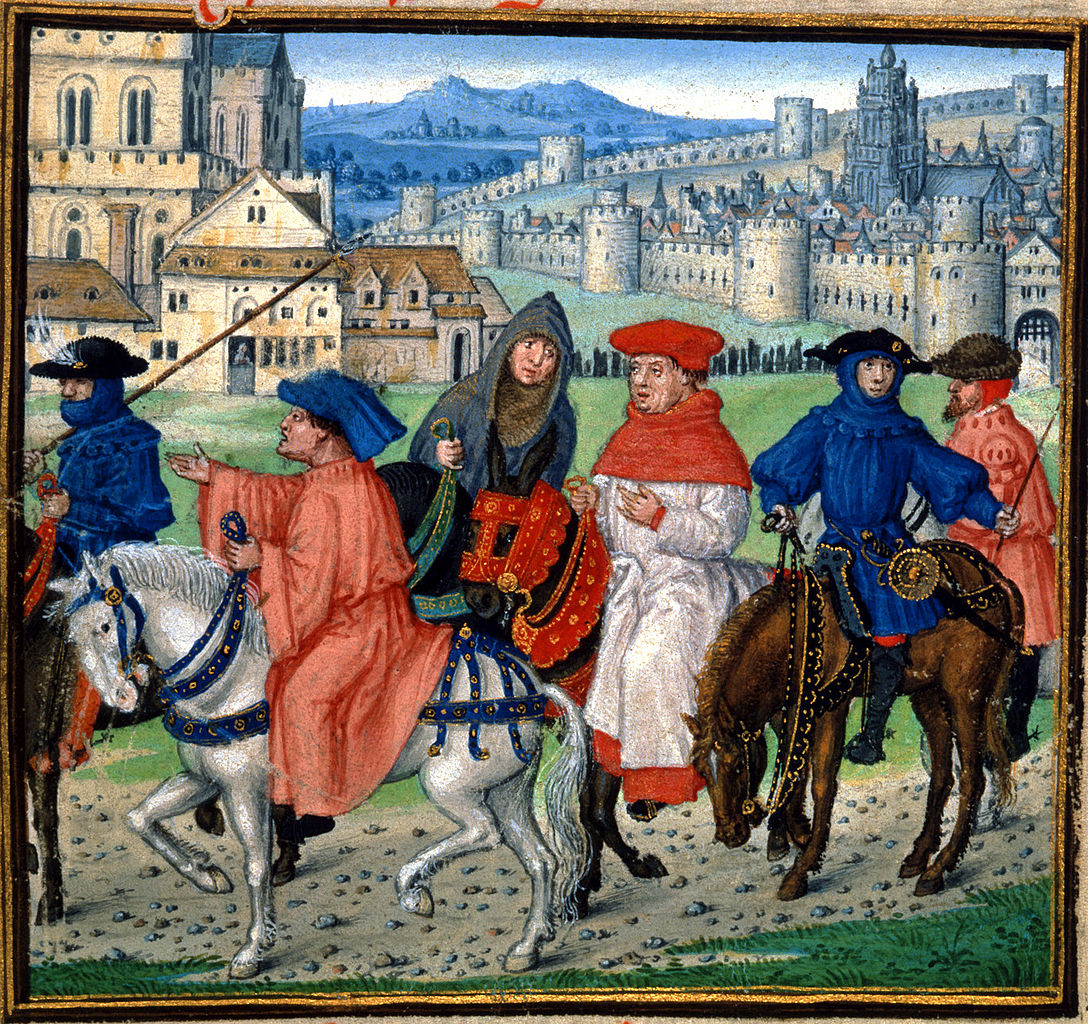The Canterbury Tales - Canterbury
Oh, my dear peeps, have I got a treat for you! You know how much I love talking about history, and today we are going to dive right into one of the most famous works of literature from the Middle Ages – The Canterbury Tales!

Let's start with a brief overview, shall we? The Canterbury Tales is a collection of 24 short stories that were written by Geoffrey Chaucer in the late 14th century. The stories are told by a group of pilgrims who are traveling to the shrine of Saint Thomas Becket at Canterbury Cathedral.
Chaucer's tales, as they are often referred to, are written in Middle English and are known for their vivid characters and social commentary. The tales are a reflection of the society Chaucer lived in, and they cover a wide range of subject matter, including love, infidelity, politics, and religion.
One of the things that makes The Canterbury Tales so unique is the way in which Chaucer tells the stories. Each of the characters has their own distinct voice, and Chaucer often uses humor and satire to comment on the world around him.
But perhaps the most fascinating thing about The Canterbury Tales is the fact that Chaucer never actually finished the work. He had planned to write about 120 tales, but only completed 24 before his death. Despite this, The Canterbury Tales remains one of the most important works of literature from the Middle Ages and is still widely studied today.
Now, let's take a closer look at some of the characters in The Canterbury Tales. One of the most memorable is the Wife of Bath, a strong-willed woman who has been married five times. She is a complex and fascinating character who challenges traditional ideas about gender and relationships.
Another memorable character is the Knight, a nobleman who is held up as an exemplar of chivalry and honor. His story, which is the first in the collection, sets the tone for the rest of the tales and emphasizes the importance of honor, truth, and loyalty.
And then there is the Miller, a rough and rowdy character who tells a bawdy tale that is sure to make you blush. One of the most interesting things about The Canterbury Tales is the way in which Chaucer uses humor and satire to comment on the values and beliefs of his time.
So, what can we learn from The Canterbury Tales? Well, for one thing, it reminds us that the Middle Ages were not a monolithic period of history. Instead, they were a time of great diversity and complexity, with people from all walks of life and with a wide range of beliefs and ideas.
Furthermore, The Canterbury Tales reminds us of the power of storytelling. By telling tales that are both entertaining and thought-provoking, Chaucer was able to comment on the world around him and to connect with his audiences in a way that was truly remarkable.
History and Address
The Canterbury Tales was written in the late 14th century by Geoffrey Chaucer, an English poet and author. The tales are set against the backdrop of a group of pilgrims who are traveling to the shrine of Saint Thomas Becket at Canterbury Cathedral.
The tales are a reflection of the society Chaucer lived in, and they cover a wide range of subject matter, including love, infidelity, politics, and religion.
The Canterbury Tales has had a lasting impact on English literature and culture, and it is still widely studied today. The tales have been adapted into countless films, TV shows, and plays, and they continue to capture the imagination of readers and audiences alike.
Chaucer himself was a fascinating figure, and his life is shrouded in mystery. We know that he was born in London in the early 14th century and that he worked as a civil servant and a diplomat. He was a prolific writer, and his other works include Troilus and Criseyde and The Parliament of Fowls.
If you are ever in the UK, be sure to visit Canterbury Cathedral, where you can see the shrine of Saint Thomas Becket and imagine the pilgrims from The Canterbury Tales making their way to this sacred place.
FAQ
What is The Canterbury Tales about?
The Canterbury Tales is a collection of 24 short stories that were written by Geoffrey Chaucer in the late 14th century. The stories are told by a group of pilgrims who are traveling to the shrine of Saint Thomas Becket at Canterbury Cathedral.
What is the significance of The Canterbury Tales?
The Canterbury Tales is one of the most important works of literature from the Middle Ages and is still widely studied today. The tales are a reflection of the society Chaucer lived in, and they cover a wide range of subject matter, including love, infidelity, politics, and religion.
Why is storytelling important?
By telling tales that are both entertaining and thought-provoking, Chaucer was able to comment on the world around him and to connect with his audiences in a way that was truly remarkable. Storytelling has the power to bring people together, to entertain, and to inspire.
What can we learn from The Canterbury Tales?
The Canterbury Tales reminds us that the Middle Ages were a time of great diversity and complexity, with people from all walks of life and with a wide range of beliefs and ideas. Furthermore, it shows us the power of storytelling to comment on the world around us and to connect with others.
Where can I learn more about The Canterbury Tales?
There are countless resources available online and in print for those who want to learn more about The Canterbury Tales. Start with your local library or do a quick search online to discover a wealth of information and scholarship on this fascinating work of literature.
If you made it this far, congratulations! You are now officially a Canterbury Tales expert (or at least you know a little bit more than you did before). Now, go forth and impress your friends with your newfound knowledge!




Post a Comment for "The Canterbury Tales - Canterbury"